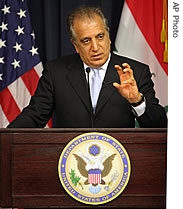2007年VOA标准英语-Khalilzad Calls Middle East 'Defining Challenge(在线收听)
United Nations
24 April 2007
Veteran U.S. diplomat Zalmay Khalilzad has taken over as ambassador to the United Nations, saying he sees the greater Middle East as the defining challenge of our times. From U.N. headquarters, VOA's Peter Heinlein reports Khalilzad left almost immediately on a Security Council fact-finding mission to Kosovo.
 |
| Departing U.S. ambassador to Iraq Zalmay Khalilzad gestures during a press conference in the heavily fortified Green Zone in Baghdad, 26 Mar 2007 |
Speaking to reporters on his second day at U.N. headquarters, Khalilzad said his priorities will include increasing the world body's engagement in Iraq, which has been limited since the 2003 terrorist attack on U.N. headquarters in Baghdad. He said a lot is at stake in Iraq, not only for Iraqis, but for the entire Middle East.
"What happens in Iraq is important for Iraqis, but its also important for the future of region," he said. "And future of the region, of the broader Middle East, is the defining challenge of our time, the way Europe was for a long time the source of many of the world's security problems. Unfortunately, many of the security problems of world emanates from that region."
Khalilzad said he would also be focusing on African issues, in particular persuading Sudan to accept the so-called 'hybrid force' of U.N. and African Union peacekeepers in Darfur.
We would like government of Sudan to cooperate with the hybrid force, not only to cooperate in words, but in reality on ground, in deed, and what will support engagement with the government in Sudan, but appropriate pressure as necessary to increase its incentive to do the right thing to allow strengthening of the forces that are there to improve the security situation as part of a comprehensive approach to deal with the problem of Darfur," he added.
Khalilzad succeeds former U.S. ambassador John Bolton, who earned a reputation for combativeness as he aggressively pursued U.S. interests. Khalilzad said he, too would speak out for American values, but suggested his style would be different.
"I for my part will do what I can, by engaging others, listening to them, being respectful, I believe that we don't have all the answers, and others have good ideas as well, and I will be thoughtfully listening to them," he noted. "I'm a problem solver, I will not posture, I will work to resolve together differences that we have so we can advance the agenda, which is to improve the situation for the people of the world."
Khalilzad, a Muslim who holds bachelor's and master's degrees from the American University in Beirut, said Lebanon would also be among his priorities. He pledged to work with his fellow ambassadors and Secretary-General Ban Ki-moon on pushing Lebanon's government to establish a tribunal in the murder of former prime minister Rafik Hariri.
Khalilzad's first focus, however will be Kosovo. In only his second day of the job, he joined other Security Council ambassadors on a trip to the Balkans to determine whether to accept a U.N. envoy's recommendation that the Serbian province be granted independence. When a reporter asked if he had a message for the people of Kosovo, he replied, "The message is, it is time to bring this issue to closure."